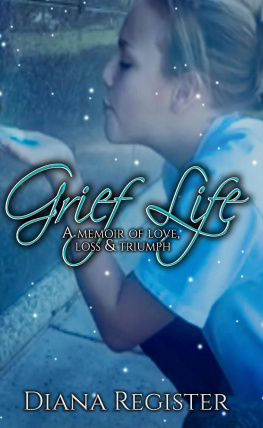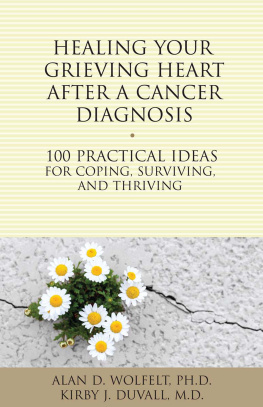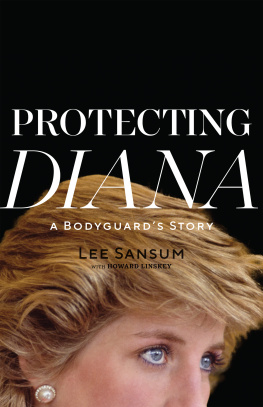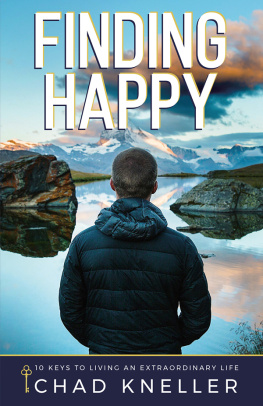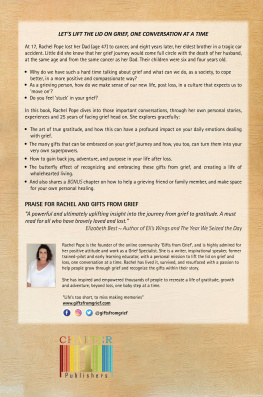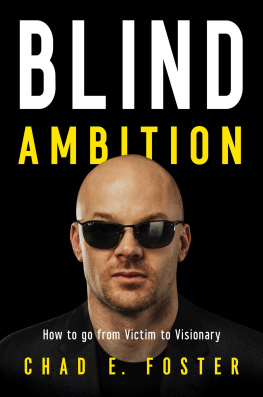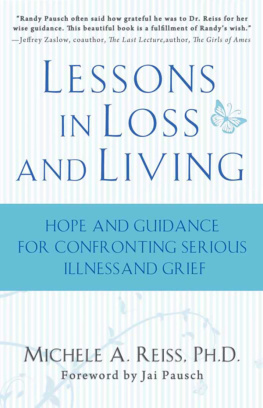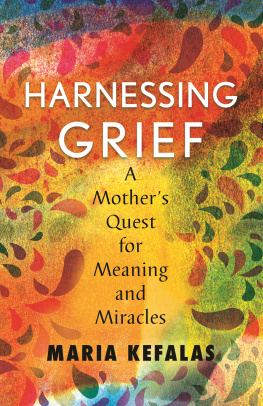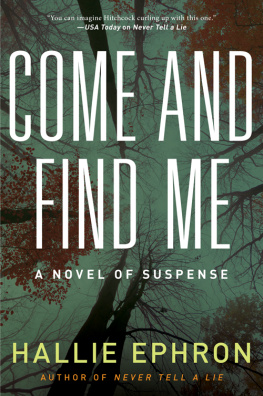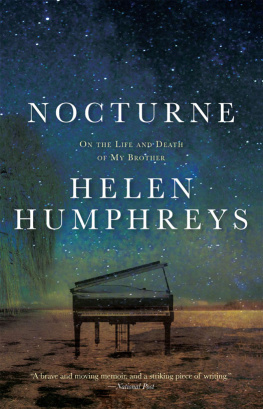GRIEF
LIFE
Written by Bestselling Author
Diana Register

Copyright 2018 by Diana Register/Crazy Ink
All rights reserved. No part of this publication may be reproduced, distributed or transmitted in any form or by any means, without prior written permission.
Crazy Ink
www.crazyink.org
Formatting by Crazy Ink
Edits by Melissa Day
G rief Life /Diana Register.1st ed.

As always, for Chad
Stephen, Savanna, Shane and Kaitlyn, you all have my heart and you know you had his. I am so proud of all of you.
My mom, for understanding what grief is and showing me how to survive.
Trina Rogers, for introducing me to what grief life means. #lovetohannah www.bdsra.org
My Whipple Warrior Family who understands my true grief.
My amazing friends for always standing by me and loving me through it.
To the City of Caldwell and the City of Nampa police departments for always honoring this great man of mine.
To my friends on social media near and far I dont care if we have never met. Youre my family.
For Eliza and www.lovewhatmatters.com, for giving me a chance.
T o the random people who reach out.
And to Scott words fail me at times. Thank you for walking this crazy road with me. Thank you for wanting to hear the stories. Thank you for understanding my quirks. Thank you for loving the broken me.
I met Diana through Facebooks Whipple Surgery Survivors Group. Her husband had just been diagnosed with pancreatic cancer and been recommended for Whipple surgery, whereas I had just gotten out of the hospital after my own Whipple. I was diagnosed with pancreatic cancer in 2014.
I was drawn to Dianas posts and questions for several reasons reasons that are reflected here in Grief Life . The first was her no-holds-barred authenticity. Diana tells it like it is and doesnt hold anything back. The second was her enduring love for her husband Chad. That love was expressed in her every word, clear and compelling. And third was her fear. Pancreatic cancer is a deadly disease and the Whipple is no guarantee of a happy outcome, as Dianas story, and my own, makes all too real. There are very few happy endings after a diagnosis of pancreatic cancer, and Dianas posts made it clear that she was afraid of losing her husband.
Because I was drawn to Dianas posts, I gave her the best, most clear and compelling answers I could. And we came to respect each other, then to appreciate each other, then to love each other.
Grief Life is not a story about how to get past your sorrow over losing a loved one. You can never truly get past it. Its not a story of triumphing over your sadness, because the sadness is always there. Grief Life is a story about transcending grief through embracing it, allowing it to occupy its proper place in your life without letting it break you or define you. The book is full of practical advice and emotional validation, delivered with humor, compassion, and the same sort of no-holds-barred reality that is the hallmark of Dianas writing.
As I write this, I am battling a recurrence of my pancreatic cancer. I am Stage 4 now, with no chance of winning my battle with this demon. My life span is measured in months, at best. But Grief Life has taught me many things that, as the dying spouse, I needed to know. Mainly, it has taught me that my family will be all right after I have left them because I never truly leave them if they embrace what Diana is teaching in this book.
I encourage anyone who has suffered a loss (and as Diana points out, everyone has suffered a loss at some point) to read and embrace Grief Life .
- Jim Hart
Raleigh-Durham Affiliate Chair
Pancreatic Cancer Action Network
Grief is like the ocean; it comes in waves, ebbing and flowing. Sometimes the water is calm, and sometimes it is overwhelming. All we can do is learn to swim. Vicki Harrison
M y husband, Chad, died June 24, 2016. Since then, I have been trying to figure out what to do with my grief. How to process it. How to understand it. How to live with it. Its not been an easy road, but its the road I am on, and the one I have to accept. I assume if youre reading this you have experienced a loss in your life and are grieving and trying to make sense of it much like the rest of us are.
During my healing process, I found it cathartic to write. I started journaling my grief in a series of Facebook posts and, eventually, began writing a weekly grief-type column for the website, www.lovewhatmatters.com . It was the outlet that I needed. It helped me decipher things. It helped me put what I was feeling into words and gave me the chance to get all the toxins out, so to speak. It was a release. For others, it might be exercise or a hobby or work or kids or anything that keeps them occupied, but for me, its writing. But what I got from it was so much more than just a place to write. I got the opportunity to get to know and bond with a community of people who were feeling the same way I was. They understood. They got it. They identified with it. And it made me realize that I am not alone.
Somewhere along the line I decided that I needed to write a book about my story, my grief and my healing process. I am so lucky that I have heard from so many people across the world who have told me their stories, but I am indebted to hear from the people who have written to me to tell me that my story has helped them. When I started receiving those, I just knew I had to write this. But, as much as I knew I needed to do this, I have struggled with how to do it. I am not a celebrity. I am not a psychologist. I am just some girl in Idaho who has lost her husband and chosen to be vocal about how awful that is. I want to write the story and give some advice but sometimes, I am not even sure I know what to do. Sometimes, I am still lost. Sometimes, I am still sitting in this weird fog and cant get out. Sometimes, I am totally confused and, sometimes, I am still angry. I questioned myself about whether or not I even had the right to put this all into words, but after reading some of the responses from my articles, I have realized that really, what people want to know is that theyre not alone. Sure, people want to know what to do in grief. Sure, people want to know how to get through it. But what they really want is to know that somebody else knows what this feels like. They want to know that somebody else has felt a great big huge loss and theyre surviving it. Yes, they want to know that you can do this without a million dollars in the bank or a following of a million people on Instagram. Yes, they want to believe that if some girl in Idaho can do it, then they can do it too.
Next page
